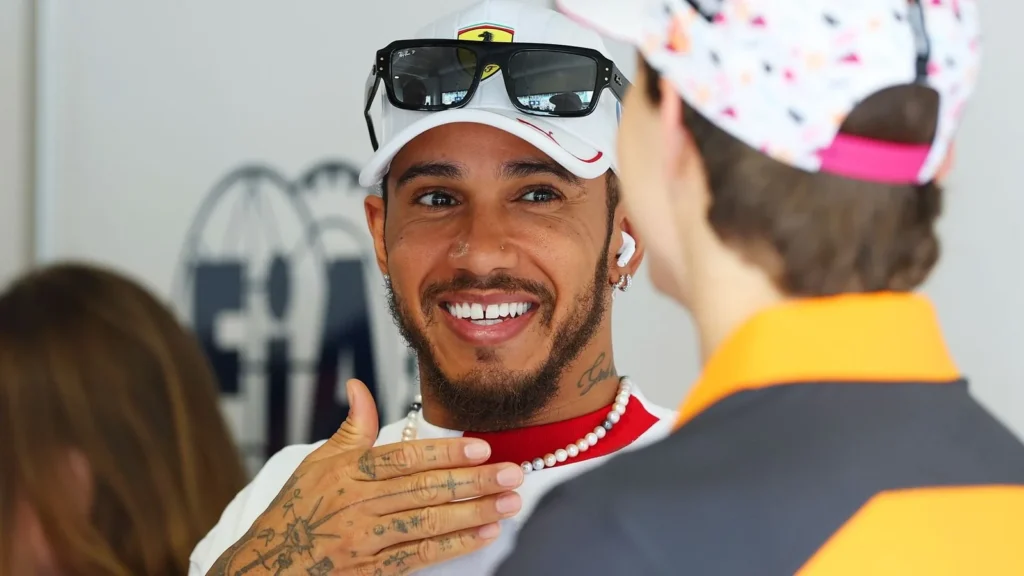
Ferrari’s 2025 season is shaping up to be a paradox, one of promise, yet plagued by persistent cracks. There’s no denying that Lewis Hamilton’s arrival has injected a renewed sense of belief into Maranello, but belief alone doesn’t deliver titles. With questionable strategy calls, underwhelming race-day execution, and a leadership structure still bedding in, Ferrari continues to straddle the line between a team on the brink of resurgence and one stuck in a perpetual rebuild.
Hamilton’s Hunger Meets Ferrari’s Mythology
When Lewis Hamilton said the “fire in [his] belly” led him to Ferrari, it marked more than a career move—it was a statement of intent. This is no longer about chasing wins; it’s about chasing legacy. Ferrari represents something Hamilton hasn’t had in years: the chance to build a project from the ground up. His telling remark to Fred Vasseur, “you don’t need to sell me the dream, I see it”, underscored that he’s buying into more than performance metrics. He’s buying into culture, ambition, and unfinished business.
And if this reinvigorated version of Hamilton had appeared earlier in his final Mercedes stint, he likely would’ve been in the fight for third in the 2024 standings. His focus now seems less about redemption and more about reinvention.
Vasseur Leads, But Serra is the Mastermind
Publicly, Fred Vasseur has taken control of the narrative. But internally, it’s becoming increasingly clear that the real architect of Ferrari’s performance shift is Loïc Serra. The ex-Mercedes man is starting to make his imprint, not with sweeping changes, but with subtle refinements: improved tire management, smarter in-season upgrades, and a car that no longer falls apart in dirty air. Where Vasseur offers stability and transparency, Serra provides technical firepower. Together, they form a leadership duo Ferrari has long lacked, one that balances politics and performance.
Strategy Woes and Pitwall Paralysis
Despite structural progress, Ferrari’s race-day execution continues to drag the team down. Engineers Xavier Marcos Padros and Riccardo Adami are under scrutiny for their often indecisive and delayed communication. It’s no longer just about bad strategy, it’s about poor clarity. Ferrari can no longer afford race engineers who merely relay deltas and tire degradation. The drivers need real-time intelligence, not hesitation.
The irony is sharp: Ferrari has made significant strides in car development, yet the team radio still feels stuck in a different decade. In an era where milliseconds matter, Ferrari’s comms remain an analog glitch in a digital age.
The Data Doesn’t Lie
After Miami, Ferrari left with just 16 points, another chapter in a season already littered with missed opportunities. In fact, in three of the six races this year, they’ve scored 10 points or fewer. That’s not mid-field form, but it’s not title-chasing material either.
Vasseur has defended decisions like the Miami undercut attempt, claiming it was the “tough choice.” But Ferrari’s tough choices too often end in regret rather than reward. Strategic boldness is admirable, but without the data to back it up, it turns into strategic roulette.
And that’s the crux: Ferrari still hasn’t proven it can out-execute Mercedes, McLaren, or even Red Bull on Sundays. One could argue they’ve improved their floor, their aero, their top-line speed, but they’ve done little to evolve the culture of decision-making that continues to cost them dearly.
Rebuild or Repeat?
Ferrari finds itself at a fork in the road. On paper, they have everything they need to contend: a world-class driver pairing, a car with race-winning potential, and a leadership team that finally feels coherent. But the numbers, and the race results, paint a different picture.
The next five races are pivotal. Leclerc is nearing contract negotiations. Hamilton is watching every move. The tifosi are, too. This rebuild has all the right ingredients, but if it fails to deliver, it could set the team back further than the post-2020 slump ever did.
Still, if they do get it right? This could be Ferrari’s Mercedes-in-2013 moment—a foundational year that sets the stage for dominance. But only if they stop tripping over themselves and start racing like the team they claim to be.
